Daily
Way Back When
Remember beaming? Sending your info (or a memo or a short message) to another with a touch of a button. It was a big thing eight or ten years ago with owners of Palm Pilot Vs and I-don’t-which-other-handhelds. When it first came in I used to think it was so amazing. No more writing stuff down! But it’s gone now…a vanished technology. Even the Palm Pre doesn’t have it.
Praising Education, Molina
In Contention‘s Kris Tapley is now a comrade-in-arms regarding Lone Scherfig‘s An Education, which he saw last night and is calling “near perfect,” a “knock-out” and “something close to a miracle — that rare occasion when a filmmaker taps into profound truths with the help of a cast that gets it, the themes surging through every vein, a driven vehicle of purpose.
“Most of the end-of-year awards talk will surely surround Carey Mulligan‘s absolutely peerless and incredibly refined leading performance, as well it should. She won’t need much of a boost into the Oscar race when people get a load of what she has to offer here.”
But Tapley is especially enthused about Alfred Molina‘s performance as Mulligan’s penny-pinching, furrow-browed dad. Molina “has no showy moment” in the film, and “has nothing you would say represents a classic Oscar clip” and yet his performanc is “the work of a master at the top of his game. I was more affected by his subtle additions to the film than I expected and that, I’d say, is the hallmark of an accomplished supporting performance.
The Education ensemble “could well get its props from the Screen Actors Guild come year’s end, but they also deserve individual commendation: Mulligan, Molina, Peter Sarsgaard, Cara Seymour, Rosamund Pike, across the board.”
Finally Franken
It only took the Minnesota Supreme Court seven and three-quarter months to hear the arguments, evaluate the data and decide that Al Franken should be certified as the winner of that state’s ridiculously prolonged Senate race. May the scumbag Republicans who goaded Norm Coleman, Franken’s vanquished Senate race opponent, into contesting this thing well past the point of rational dispute suffer some form of payback.
The N.Y. Times is reporting that Republican Gov. Tim Pawlenty, whom I suspect has been a secret go-along scumbag in this affair, “had indicated as late as Monday that he was willing to certify Mr. Franken as the winner once the state’s highest court decided the recount and Mr. Coleman’s battle. On CNN on Sunday, Mr. Pawlenty said: ‘I’m prepared to sign it as soon as they give the green light.'”
Coleman should have done the gentlemanly thing and bailed on this thing months ago. I wouldn’t put it past the Republican hardhead machine to keep pushing because they’re animals and incapable of showing shame. Franken however, does finally seem poised to become the 60th Democratic Senator.
The Tread on Borat’s Tires
Laugh-out-loud amusing and “outrageous” as it sometimes is, Sacha Baron Cohen‘s Bruno (Universal, 7.10) — oddly — isn’t all that funny. Certainly not in a convulsive sense. It is sort of heh-heh funny in a dry, observational, “is that all there is?” sense… but what’s that? It’s basically a series of misanthropic “screw you” jokes — 82 minutes worth of effete put-on gags, each one meant to provoke homophobic reactions to SBC’s flamboyantly gay, blonde-coiffed Austrian fashion reporter. The point being to “get” the constipated illiberal, small-minded types by making them look bad.
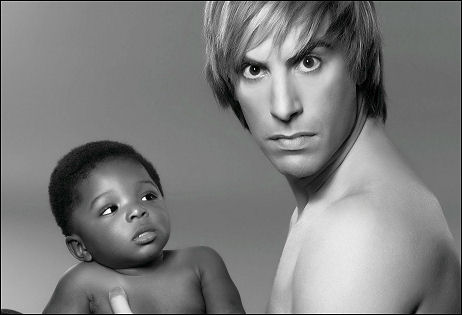
All I can say is that clips and promotions and put-ons are one thing, but when you sit down for a movie you expect a certain build-up of dramatic and emotional elements — you need to see characters and story threads start to take shape and transform and “pay off” in some way. Bruno never even tries to get off the ground in this sense.
Neither did Borat, I realize, but this time the lack of undertow felt like more of an issue. I said to myself about 20 minutes in, “Wow…this isn’t happening.” I said the same thing at the 40-minute mark. Although Bruno has loads of great bits and goofs and snide attitude to spread around. Let no one say it doesn’t score from time to time.
The problem for me is that (a) the tread has worn down on the tires since Borat — a comedy of this kind just doesn’t feel as out-there brash as it did three years ago, in part because it’s harder to believe that the encounters in the film aren’t staged or performed by the victims, (b) the humor is more than a bit cruel and misanthropic at times, and (c) SBC’s Bruno character simply doesn’t work as well as the revolutionary Borat.
Borat was funnier because it was at least faintly conceivable that a dorky moustachioed TV correspondent from a small Kazakhstan backwater could be that culturally clueless. But Bruno is no idiot — he’s from Vienna, knows the fashion world, knows the rules of the game. The joke is supposed to be that he’s so blinded by ego, arrogance, ambition and random sexual arousal that he doesn’t realize how offensive and irritating he is to everyone he meets. And that’s just not buyable.
So what we’re left with is just watching SBC doing his best to put people on and make them squirm as best he can. I’m obviously gay, you’re perhaps a little uncomfortable with gay men, and so I’m going to up the ante more and more until that discomfort tips into some form of hostility (usually suppressed). Over and over and over. Because I’m convinced that you’re a yahoo of some kind, and the point of this film is to expose you as same and too bad if you don’t like it, Ugly American.
For me the best Bruno material has already been seen in the trailers and clip reels. The marketing campaign has been amazing. There’s certainly nothing in the film as good as SBC dropping into Eminem‘s lap on the MTV Award show. Or his recent Tonight Show appearance with Conan. All right, the Arkansas wrestling match sequence comes close, although (again) it’s not really all that hah-hah funny.
My favorite Bruno moment comes when Harrison Ford is confronted by a microphone-wielding SBC and barks a harsh “fuck off!” as he gets into a car. Why did I savor this in particular? Because it’s the only time that a victim expresses more hostility towards SBC than what he/she is getting from SBC to begin with. In short, Ford trumps. He’s saying in effect, “I don’t want to hear it, just go away, you’re not worth it, don’t even start…I’m ahead of you!”
I also liked a visual gag that I’m not going to spoil (although Variety‘s Todd McCarthy already has in his review) that involves a certain part of the male anatomy talking and gyrating.
Who was the first Bruno? Andreas Voutsinas, the thin, devil-bearded gay guy in Mel Brooks‘ original film of The Producers (’68). His character’s name was Carmen Ghia. He was living with Christopher Hewett‘s Roger De Bris (the guy Gene Wilder was referring to when he said “Max, he’s wearing a dress!”), and his first Bruno bit was when he, Wilder and Zero Mostel take a brief elevator ride together and he does a kind of suppressed-erotic-writhing routine.
I agree with McCarthy that the “gotcha!” sequence in which SBC pretends to come on to Ron Paul, who ran in last year’s Republican primaries (and whom my son Dylan was for until he switched to Obama), is “noxious.” When Paul realizes what’s going on he freaks and shows his true homophobic colors, but it didn’t feel fair or right.
I don’t want to sound overly negative here. I did laugh several times during Bruno. I came out in a relatively okay mood, wasn’t pissed off. But a feeling that it didn’t really make it began to grow in the days that followed. I tried writing about it yesterday but the review wouldn’t come, probably because I was torn between admitting to myself that I laughed and chortled at times and also realizing that the film has hostility and believability problems.
Remember that moment in Mad Dog and Glory when Robert DeNiro‘s cop character tells Bill Murray‘s mafioso character (who does a little stand-up) that jokes don’t work as well when they’re “aimed out” and that people tend to laugh more when they’re “aimed a little more in” — i.e., at the teller?
Parking Garage
“Is it a sign of impending apocalypse that two terrible Nia Vardalos movies have been released in one month?” asks critic Marshall Fine. “It seemed unlikely that Vardalos could star in a movie flatter or more desultory than My Life in Ruins. But she’s outdone herself with I Hate Valentine’s Day (IFC, 7.3), which she wrote and directed and stars in.
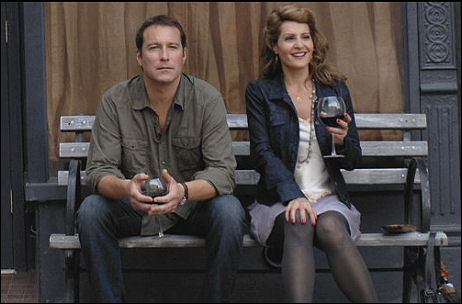
John Corett, Nia Vardalos in I Hate Valentine’s Day
“For good luck, apparently, she cast John Corbett – her love interest in My Big Fat Greek Wedding, – as the male lead. But she could have cast anyone from Brad Pitt to a fencepost and it wouldn’t have made a difference. The writing is that flavorless, the directing that inept.
“Vardalos doesn’t write dialogue; she writes shtick. Riffs on why she hates antiques, riffs on why relationships suck, riffs on — well, really, the whole thing is one long riff, with few laughs and an inevitable destination. As a director, Vardalos is too in love with her own genius. There isn’t a scene that isn’t overlong, mostly because she inserts pauses between each line of dialogue so lengthy you could park a car.
“If you snipped three-to-five seconds from every shot in the film (and, believe me, you could), the movie would barely reach feature length. Better yet, snip away everything after the opening credits and save everyone a lot of time and expense.”
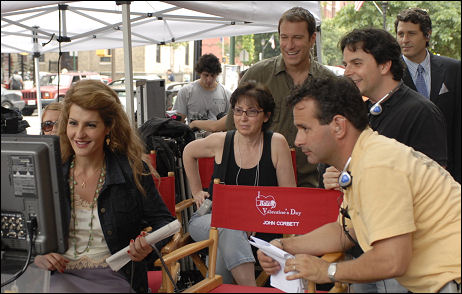
Oh, Come On
A friend wrote last night that “there’s a rumor starting that Eddie Murphy wants to play Michael Jackson in a biopic.” Patently absurd on more levels than I’d care to list, I wrote back. He’s too old, for one thing. He doesn’t remotely resemble Jackson. His voice is all wrong. He isn’t willowy or feathery or girly enough. “I don’t even know why I’m pointing this stuff out because it’s one of the silliest casting ideas I’ve heard in ages,” I concluded.
There’s a film, obviously, in Jackson’s story. But it would have to be called The Damned or, if the producers want to sound less judgmental, How To Ruin Your Life. And they’d need to cast someone who would look exactly like him and could obviously play him to a T. Someone young, androgynous, unknown. Wait…it just hit me. They should do a Cate Blanchett in I’m Not There and cast a young African-American woman. I’m serious.
Does the idea of re-using the title of of Luchino Visconti‘s 1969 classic seem harsh to anyone? Think again. But first re-read all the articles that Maureen Orth wrote about Jackson for Vanity Fair, particularly an April 2003 piece called “Losing His Grip” and a March 2004 followup called “Neverland’s Lost Boys.”
Fake HD
MSNBC switched over to high-def today, although it won’t show up on all the cable systems until early August. It kicked in with my provider, Century Cable, three days ago. So I tuned in this afternoon — channel 723 instead of the regular analog channel 23 — to see how good it looked, and it looked like hell. All pixellated and degraded — basically an analog image with a 16 x 9 aspect ratio. I know what the real thing looks like. This is crap.
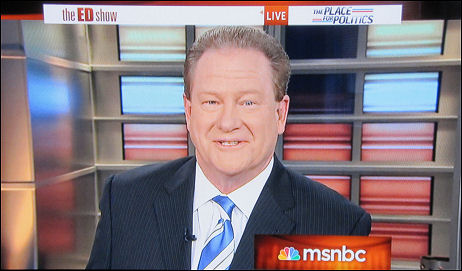
Other Side of the Canyon
Variety‘s Anne Thompson has a decidedly negative view of Michael Mann‘s decision to “immerse the audience” in the 1930s by shooting Public Enemies in high-definition video. “HD is clear, harsh, honest” she notes. “It works fine in a contemporary setting like Collateral or Miami Vice. But when audiences watch a period film, no matter how authentically recreated, they aren’t expecting it to look like this.”
On 6.24 I posted the same initial reaction — this is different! not my father’s 1930s! — except I found it exciting and audacious. “Public Enemies is out there with a radical use of razor-sharp, high-def digital widescreen photography that totally says ‘not the early 1930s!’ and ’55-inch LCD screens at Best Buy!’ But at the same time it says ‘actually, this is the real early 1930s without the rat-a-tat-tat Pennies From Heaven squawkbox atmosphere and embroidery and Jimmy Cagney-Paul Muni personalities that you’ve been conditioned to expect.”
Last of Heath
Heath Ledger “was always hesitant to be in a summer blockbuster with the dolls and action figures and everything else that comes with one of those movies,” the late actor’s friend and agent, Steven Alexander, tells Peter Biskind in an upcoming Vanity Fair. “He was afraid it would define him and limit his choices.”
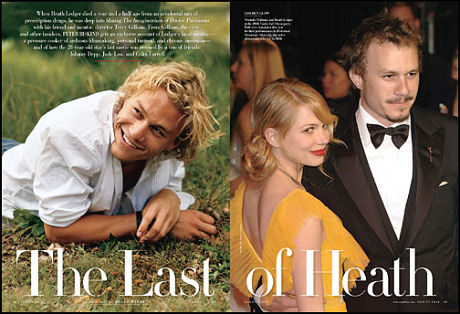
Alexander and other confidantes tell Biskind that “one of the reasons Ledger agreed to do The Dark Knight was that it would be such a long shoot it would give him an excuse to turn down other offers. Ledger had a pay-or-play deal on The Dark Knight — meaning he’d get compensated no matter what — so he felt he had the freedom to do whatever he wanted as the Joker.”
He hoped in fact, that “his performance would be so far-out he’d be fired, and thus become the beneficiary of a lengthy, paid vacation.”
Which is why his Joker performance was so great. Because Ledger didn’t care. The best creative work always….okay, often comes out of a fuck-it mindset. Worry about what you’re going to create or whether or not you’ll be good enough and you’re dead.
No Despair
Not every day can be well organized and super-productive. I was going to bang out my Bruno review (the green light is up) but it wouldn’t happen. When the plane doesn’t lift off the ground and it’s suddenly 4:30 pm when it was only noon an hour earlier, you just have to suck it in and try to do better the next day. And now I have to catch a 6 pm screening of Nia Vardalos‘ I Hate Valentine’s Day. And my early-bird DVD seller still doesn’t have Lonely Are The Brave, which streets on 7.7.
Mess
There’s just no end to the ick factor in the Michael Jackson tragedy. Everything that’s being reported sounds sordid and sad. Or it’s been made up. The Sun posted a story today about the late pop singer’s ghastly physical state — appalling — and then TMZ reported that the story is fake. And 95% of the world is repeating the same mantra — “Ignore the facts, deny the damage, ignore what Michael Jackson became — just listen to the music and focus only on his peak-of-popularity years in the ’80s and early ’90s.”
I found it moderately unpleasant to watch Al Sharpton — Al Sharpton? — and Joe Jackson hold a news conference this morning about delayed funeral arrangements for Michael, matters of executorship and custody of the kids, etc. Because there was no shaking off the feeling that these guys are basically hustlers looking to self-promote, revive the MJ brand, get their cut, bask in media attention, spread around the b.s. and blah-blah.
And on top of all this Universal has decided to cut the 100% non-offensive LaToya Jackson scene out of Bruno altogether.
